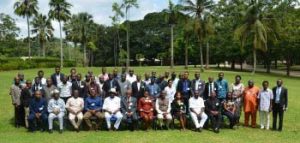TAAT holds inception workshop with Business Innovation Facility
The Technologies for African Agricultural Transformation (TAAT) held its inception workshop at the IITA Conference Center on 9 July. The workshop, organized in conjunction with the Business Innovation Facility (BIF), aimed to address the scaling up of production and supply of High Quality Cassava Peel (HQCP) mash as a key ingredient in the production of livestock feed in Nigeria.
The workshop included discussions on ways to increase awareness among smallholder farmers, cassava processors, and end users on the extensive potential of using cassava peel. The intensive use of advocacy was encouraged along with other promotional methods including a strategy to promote cassava peel as a cost-effective alternative to maize as a source of energy for livestock feed.
Another important point was the promotion of independent small agri-business entrepreneurs deploying commercially sustainable models linking sellers with buyers of cassava peel grits. Identifying and tackling constraints in scaling up the incorporation of cassava peel grits in livestock feed was also discussed as crucial to the achievement of the TAAT objectives.
The workshop was multifaceted comprising multiple TAAT value chain compacts as stakeholders from the poultry industry, feed industry, fabricators, government representatives, poultry farmers’ association, catfish farmers, garri processors, and academia were present.
Speaking at the workshop, Nigeria Country Representative of the International Livestock Research Institute (ILRI), Dr Tunde Amole said cassava peels are a major environmental pollutant and investing in this transformative technology not only provides feed for poultry, pig, cat fish, etc., but also creates more wealth for farmers and helps in waste management.
Various presentations were made on the results of several trials and participants discussed other possibilities for wider use of HQCP mash as well as relevant issues and opportunities related to the technology. The workshop was concluded with an overview of a workplan to improve livestock productivity using this alternative feed resource.
BIF is a five-year (2014‒2019), DFID-funded market systems development program that aims to improve the lives of the poor in Malawi, Myanmar, and Nigeria.
BIF works to identify and address constraints in selected markets, providing technical assistance (and some grant funding) to businesses and other market players.

